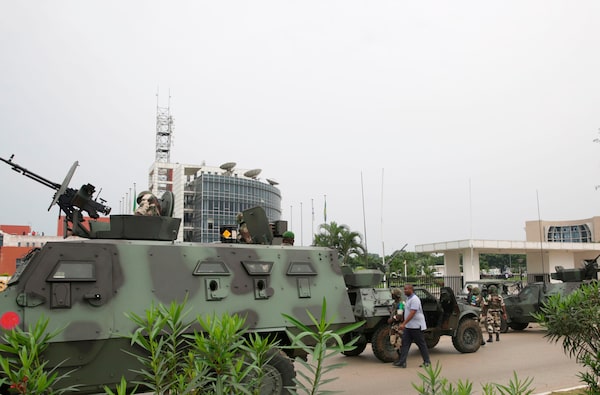
Gabonese soldiers stand in front of the headquarters of the national broadcaster Radiodiffusion Television Gabonaise in Libreville on Jan. 7, 2019 after a group of soldiers sought to take power in Gabon while the country's ailing president was abroad.STEVE JORDAN/AFP/Getty Images
One of the world’s longest-ruling family dynasties has survived an attempted coup by disgruntled military officers who seized a state broadcasting centre in Gabon and called for a popular uprising in the oil-rich African country.
Gabon’s government said its security forces had stormed the state radio headquarters, killing two of the coup plotters and arresting seven others, just hours after the military officers had burst into the building to announce the coup at dawn on Monday.
The officers, wearing camouflage uniforms and carrying assault rifles, read a statement saying that a “national restoration council” would be set up to oversee a “democratic transition for the Gabonese people.” They urged citizens to wake up their neighbours and “rise up as one and take control of the streets.”
The officers claimed to be members of the elite Republican Guard and wore its green berets, although it was unclear if they were actually members.
In the capital, Libreville, several hundred people gathered in the streets near the radio station’s headquarters, with some cheering for the coup leaders, but they were dispersed with gunshots and tear gas fired by army loyalists. Helicopters circled overhead and military vehicles rumbled through the streets as the government claimed to have restored order. Most of the city was reported to be calm.
Africa’s longest-ruling regimes have faced growing pressure in recent years as public dissatisfaction has escalated. In Zimbabwe, then-president Robert Mugabe grudgingly resigned in 2017 after a military coup brought an end to his 37 years in power. In Gambia, then-president Yahya Jammeh was forced to leave office in 2017 after losing an election, more than 22 years after seizing power in a coup. In the Democratic Republic of the Congo, President Joseph Kabila has promised to step down after ruling for 18 years, although the results of a long-delayed election on Dec. 30 have still not been announced.
In Gabon, the attempted coup was a sign of “broad socio-economic and political frustration with Gabon’s leadership,” according to a report by EXX Africa, a business-risk consultancy.
The serious illness of Gabon’s President Ali Bongo and the absence of a clear successor has heightened the risk of military mutinies and civil unrest in the streets, it said.
Mr. Bongo, 59, suffered a stroke during a visit to Saudi Arabia in October and has been outside Gabon since then, receiving treatment first in Saudi Arabia and then in Morocco.
Mr. Bongo’s family has been in control of Gabon since his father, Omar Bongo, won power in 1967 with the support of the French government. The family has been repeatedly accused of corruption on a grand scale.
According to French police investigations, the Bongo family owns 39 properties in France, including luxury homes in Paris and along the French Riviera, along with Ferraris, Mercedes and other expensive cars. An investigation in the United States concluded that the family had funnelled at least US$100-million into U.S. banks, and Mr. Bongo’s wife at one point was reportedly renting a house from the rapper Sean (P. Diddy) Combs for US$25,000 a month.
Despite the vast oil wealth of the Western African country, most of its two million people are living in poverty. The Bongo family has often faced protests and challenges in the street, but it has not hesitated to use its security forces to crack down on opposition.
Mr. Bongo, who assumed the presidency after his father’s death in 2009, narrowly escaped defeat in a 2016 election. He won by fewer than 6,000 votes in the official tally, but there were widespread complaints of electoral fraud. In one province, Mr. Bongo’s home region, the official results implausibly claimed that there was a voter turnout of 99.9 per cent, with more than 95 per cent of voters supporting Mr. Bongo.
His rival candidate, former African Union leader Jean Ping, refused to accept the election result. Protesters rallied in the streets, clashing with police and setting fire to the parliament building, but security forces launched a deadly assault on the Opposition party’s headquarters, forcing Mr. Ping to flee. Dozens of protesters were reportedly killed and more than 1,000 were arrested.
Mr. Bongo’s current health is uncertain. He made a television appearance on New Year’s Eve to deliver a brief speech, recorded in Morocco. But his words were slurred and he seemed unable to move his right arm.
Several weeks after his stroke, Gabon’s Constitutional Court transferred some of his powers to the prime minister and vice-president. In their statement on Monday morning, the coup leaders said this arrangement was “illegitimate and illegal.”
The African Union and United Nations Secretary-General Antonio Guterres condemned the coup in statements on Monday.Nathalie O’Neil, the senior Canadian diplomat in the region, tweeted: “Canada condemns the unconstitutional actions that took place today in the Republic of Gabon. We hope that calm will be restored soon to allow people to return to their regular activities.”
France, the former colonial power in the country, has a permanent force of 300 soldiers in Gabon. The United States sent about 80 soldiers to Gabon last week, saying that the troops might be needed to protect U.S. citizens and diplomatic missions in the Democratic Republic of the Congo, to the south of Gabon, where there are rising tensions over the recent election.
 Geoffrey York
Geoffrey York